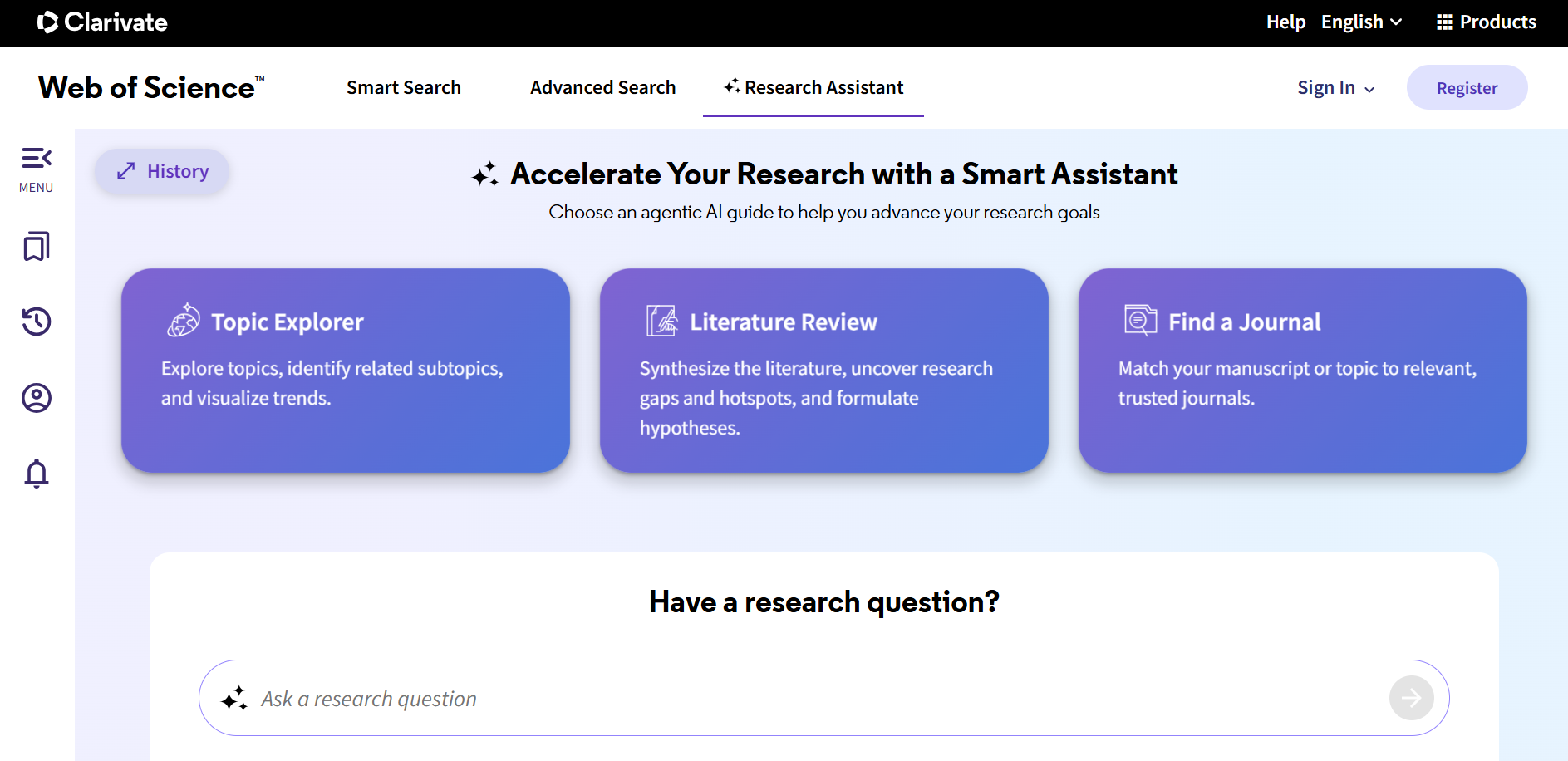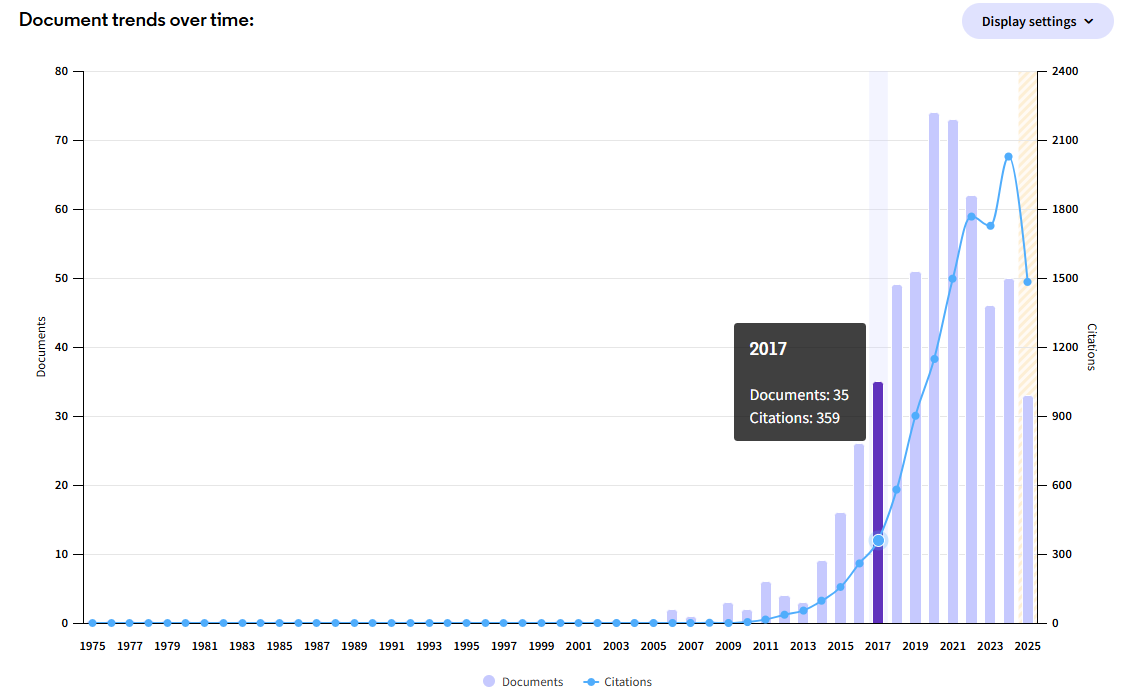Trusted AI enhances topic and journal discovery in the Web of Science Research Assistant

New agentic AI-powered guides — Topic Explorer and Find a Journal — enhance the Web of Science Research Assistant by streamlining topic discovery and journal selection for researchers.
Every research journey begins with a question, but the path to an answer is often uncertain. Researchers face vast information landscapes that require time-consuming manual processes to explore. At Clarivate, we’ve pioneered an agentic AI approach to transform this discovery experience, empowering researchers with intelligent, task-driven guides that reduce friction and accelerate insight.
We’re excited to introduce two new agentic AI-powered guides to the Web of Science Research Assistant designed to support researchers at critical moments in their journey: Topic Explorer and Find a Journal.
Advancing research with trusted data and responsible AI
Since its launch, the Web of Science Research Assistant has empowered researchers by efficiently guiding them through key tasks — drawing on the trusted Web of Science Core Collection to ensure that each insight is grounded in research from journals that have undergone publisher-agnostic evaluation for quality and credibility. It guides researchers through discovery with intuitive prompts and interactive outputs, allowing them to explore the literature without needing to master advanced search techniques or visualization tools.
Earlier in 2025, we introduced agentic AI to the literature review guide, enabling researchers to shape their questions, refine their search strategies, and synthesize relevant literature into a customizable report. This new AI technology carries out multi-step tasks and interacts with researchers to pinpoint the most relevant insights for them, making literature reviews faster and more focused. Now the guides for exploring a topic and finding a journal are also powered by agentic AI, bringing the benefits of contextual reasoning and personalized pathways to more tasks.

Figure 1: Choose from task-based guides in the Web of Science Research Assistant
Faster topic exploration
When faced with a new research question, researchers often spend hours mapping the current landscape — identifying key terms, trends, gaps, and influential voices. The new Topic Explorer guide streamlines this process, making it faster, more interactive, and more insightful.
Users begin by entering anything from a single keyword to a detailed phrase to express their topic of interest. The guide provides key definitions, subtopics, and related topics, breaking down complex subjects into simplified components. It then offers the researcher flexible next steps such as exploring related topics in more detail, generating visualizations, or identifying top authors and institutions. Early- and mid-career researchers shared positive feedback as we tested the new guide with users.
“It aligns with the ways that I teach students to think about looking through literature, in terms of looking at patterns of things that are coming together.”
– Researcher
Researchers determine the path forward, while the AI agent handles the heavy lifting behind the scenes, such as structuring queries. This interactive approach puts the researcher in control, enabling deeper exploration based on individual needs and curiosity.

Figure 2: Visualize trends with Topic Explorer in the Web of Science Research Assistant
By combining intelligent suggestions with user-driven choices, the new guide transforms topic discovery into a dynamic and personalized experience, helping researchers build a strong foundation for their studies.
“I love this integration, because I do have a lot of trust in the reliability and the factual information that it’s giving me…Because this is integrated into Web of Science, and it has all Web of Science information, it’s just supremely better than [a general purpose chatbot].”
– Researcher
Smart journal recommendation
Selecting an appropriate journal for publication is an important part of the research lifecycle. It can often be a complex decision, especially for researchers navigating unfamiliar disciplines or publishing for the first time. Submitting a study to a journal that doesn’t align with its scope can lead to rejection and significant delays, wasting valuable time and slowing research progress.
The new Find a Journal guide accommodates a wide range of situations that require journal intelligence. It is designed to solve common pain points and meet researchers where they are, whether they are starting with a broad topic area or detailed manuscript information. For those unsure where to submit their work, the guide offers prompts and intelligent matching to surface relevant journal options. Those still in the early stages — without a full manuscript — can rely on topic-based search to identify suitable journals aligned with their research area. For researchers with specific publishing requirements, interactive filters enable precise targeting.
At the core of this agent is a dual recommendation engine. For those with a manuscript title and abstract, the algorithm analyzes the content and ranks journals based on relevance using Master Journal List (MJL) data. If manuscript details are unavailable or yield limited results, the agent seamlessly shifts to a topic-based search in the Web of Science, ensuring meaningful recommendations regardless of input depth.
Each journal is presented on an informative card that includes key data such as publisher, country, ISSN, and indexing details alongside impact metrics, including indicators from Journal Citation Reports (JCR).
Agentic AI you can trust
Academic AI agents are purpose-built to support research, learning, and library workflows by performing complex, multi-step tasks with transparency and precision. Our agents are designed to guide users through nuanced processes — such as literature reviews and journal selection — while maintaining human oversight and academic integrity.
The Academic AI that we embed in the Web of Science is:
- Grounded in authoritative sources: All outputs are based on expertly curated solutions — the Web of Science Core Collection and Journal Citation Reports.
- Backed by rigorous quality testing: Clarivate applies evaluation frameworks to validate accuracy, relevance, and interpretability.
- Developed in partnership with the academic community: Solutions are shaped through collaboration with institutions and guided by academic principles.
Clarivate delivers AI agents that help save researchers’ time and accelerate research tasks while keeping humans in control. By integrating trusted intelligence into research tools, we help researchers and librarians navigate complexity with confidence, make informed decisions, and drive academic progress with integrity.
Watch a brief demo of the agentic AI guides in the Web of Science Research Assistant.









